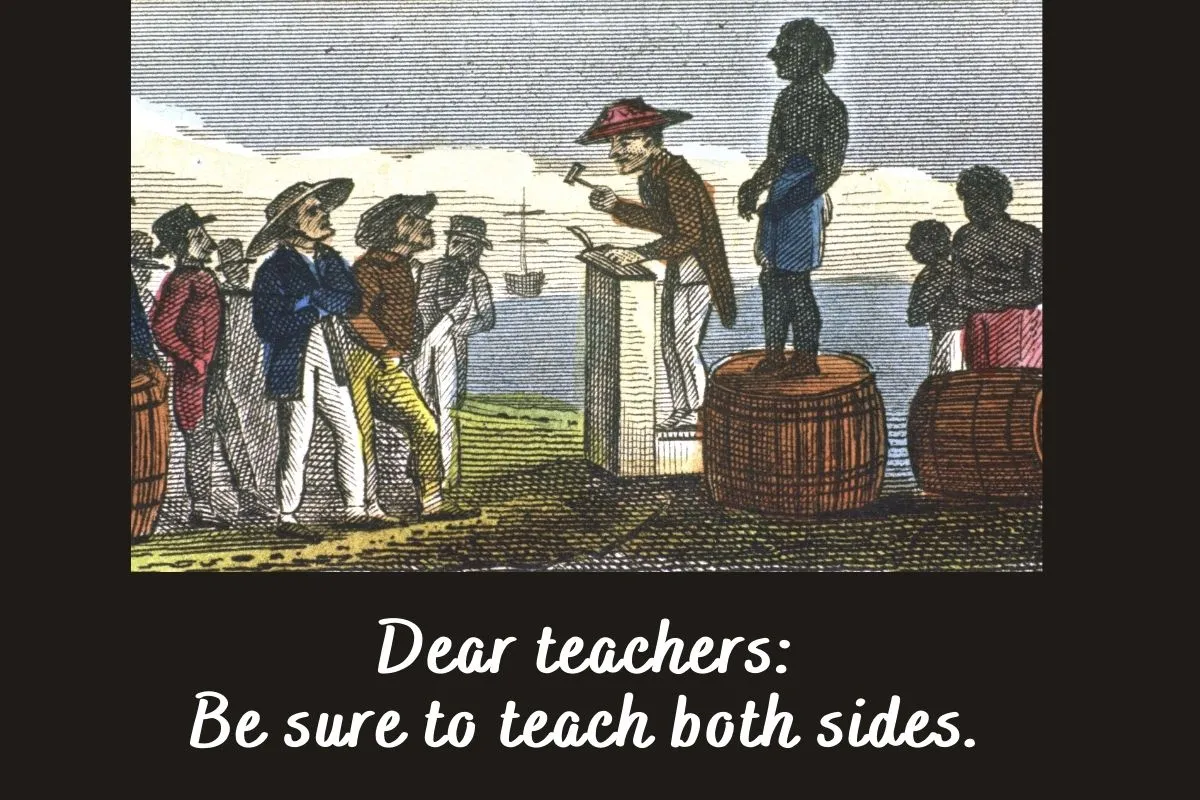GOP lawmakers in the Lone Star State passed legislation banning critical race theory from K-12 classrooms and warning teachers who teach contentious topics not to "defer to any one perspective."
Some of their Republican Kentucky kindreds have pre-filed anti-CRT bills for January’s General Assembly session. A Texas-style "both sides" bill could be in the offing, too. (The term comes from a principal telling a teacher to teach "both sides" of the Holocaust.)
The Texans seem to want a Trumpian "very fine people, on both sides" approach to certain subjects, including the Civil War, though it's not mentioned in the legislation.
"But, as the flap over Holocaust denialism demonstrated, the Texas law is vague enough that some teachers could fear teaching the Civil War without giving equal time to the 'opposing viewpoint,'" said Clay Robison of the Texas State Teachers Association.
Too, critics of CRT sometimes claim that social studies books that cover the Civil War are "biased" against the Confederacy.
The GOP thinks attacking CRT is juicy red meat for the white folks in the red MAGA hats. But CRT isn't taught in grade schools or high schools in Texas, Kentucky or anyplace else.
Explained Randi Weingarten, president of the American Federation of Teachers, my union: "It's a method of examination taught in law school and college that helps analyze whether systemic racism exists — and, in particular, whether it has an effect on law and public policy. But culture warriors are labeling any discussion of race, racism, or discrimination as CRT to try to make it toxic. They are bullying teachers and trying to stop us from teaching students accurate history."
It looks like Texas teachers might have to trot out inaccurate history and parrot the neo-Confederate line: slavery had nothing to do with the war, and their forebears didn't exit the Union to keep Black people in bondage. That's not what real-deal Confederates said. So if teachers must present the Confederate side, they should just quote the Confederates themselves. Commentary isn't necessary, and primary sources are plentiful.
What Southerners actually said about the cause of the Civil War
Charles B. Dew's little book, “Apostles of Disunion: Southern Secession Commissioners and the Causes of the Civil War” (Charlottesville: University Press of Virginia, 2001) is a great one-stop shop for quotes from rebel bigwigs.
President Jefferson Davis (Kentucky-born like Abraham Lincoln), praised slavery as an institution that "a superior race" used to turn “brutal savages into docile, intelligent, and civilized agricultural laborers.”
Vice President Alexander H. Stephens was thankful the Confederacy was based “upon the great truth that the negro is not equal to the white man; that slavery, subordination to the superior race, is his natural and moral condition.”
Dew also quotes from secession ordinances and official justifications for secession.
Mississippi secessionists said most Yankees favored “negro equality, socially and politically,” and were all in for stirring up “insurrection and incendiarism” in the Magnolia State. Mississippi “must either submit to degradation and to the loss of property worth four billions of money, or we must secede from the Union,” they argued.
When Texans pulled out, they denounced “the debasing doctrine of the equality of all men, irrespective of race and color – a doctrine at war with nature, in opposition to the experience of mankind, and in violation of the plainest revelations of Divine Law.” They condemned the Republicans for supporting “the abolition of negro slavery” and favoring “the recognition of political equality between the white and negro races.”
Dew mainly focused his book on a group of state-appointed commissioners who made the rounds of the slave states in late 1860 and early 1861, hoping to win converts to the Confederate cause. A Kentucky-born, Alabama emissary to his native state was typical.
Crittenden County-born Stephen Hale charged that the goal of Lincoln and his party was "the extinction of slavery." He argued that secession was the only way the South could sustain “the heaven-ordained superiority of the white over the black race.”
KY teachers could quote from the press of the day
If the GOP supermajority Kentucky legislature passes a Texas-type law, Bluegrass State teachers can find a long paper trail left by Bluegrass State Confederates. They might start with Kentucky's rebel press.
The Louisville Courier, a C-J ancestor and Kentucky’s main Confederate paper, said Kentucky had to secede because Lincoln and the Republicans “believe slavery is a national sin” and were determined to end it. If they did, the paper added, Black children would go to school with white kids and Blacks could testify against whites in court and serve on juries.
The Courier wondered if whites “wish to be met at the polls, and have their votes neutralized, by the suffrage of the free negroes? Do they wish to have the emancipated slave brought into competition with them in the field, in the workshop, in all the pursuits of life?”
The Lexington Statesman lambasted Lincoln as “the enemy of slavery and the hater of the South.” The Paducah Herald put Kentucky’s course thusly: “to remain with the abolition North or join the South—to remain a slave state or abolish slavery.”
The Frankfort Yeoman hissed that "Abe Lincoln, the Usurper" openly “avowed the policy of elevating the negro race to the rank of equality with the white race,” and shuddered at the prospect of “Southern lands desolated by the allied arms of Black Republicans and Black Africans.”
Dew concluded that the words of Hale and the other commissioners would seem to have refuted “once and for all, any notion that slavery had nothing to do with the coming of the Civil War. To put it quite simply, slavery and race were absolutely critical elements in the coming of the war."
Indeed, the words of the Confederates themselves could hardly be plainer: there were not "very fine people, on both sides" in America's most lethal conflict.
--30--
First posted on the Courier-Journal








